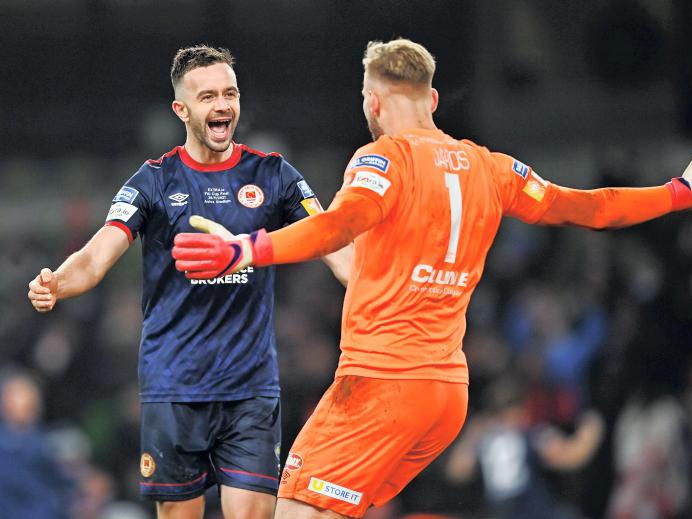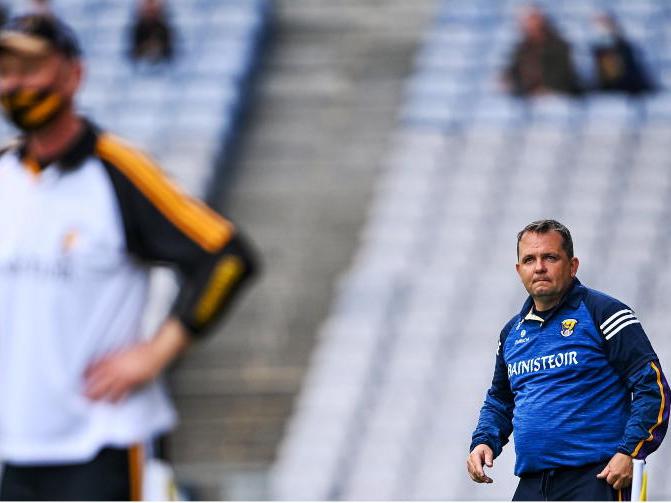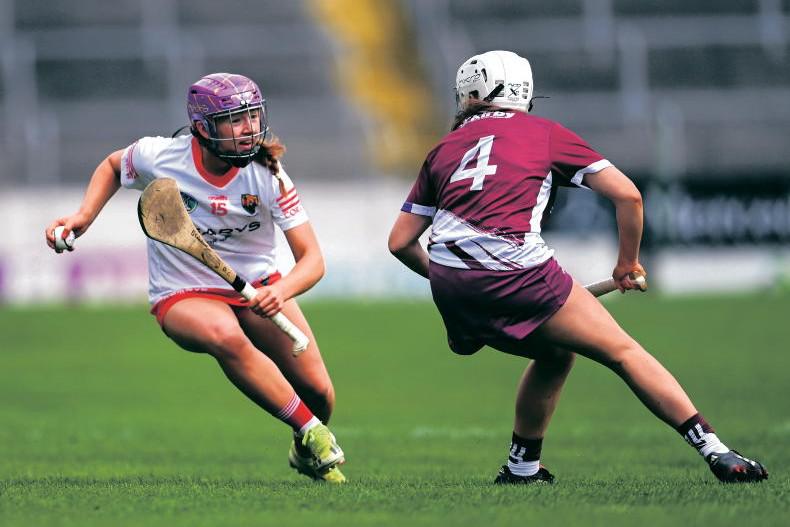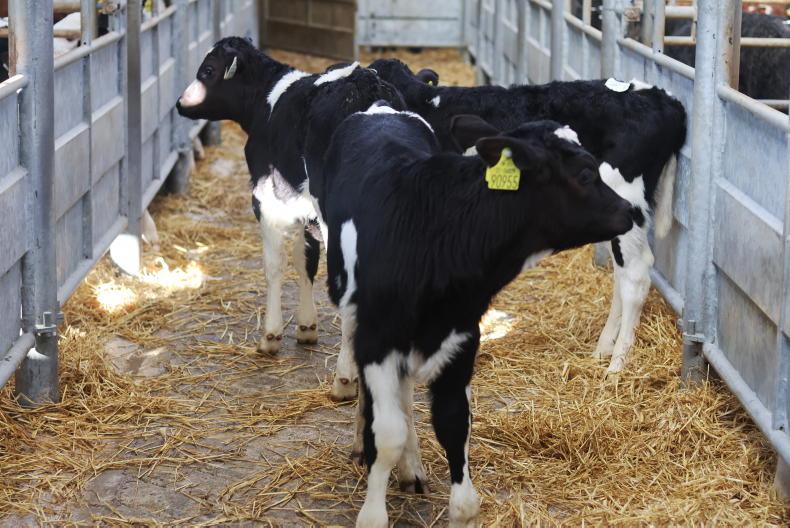The term “game-changer” is an overused one in sports journalism.
It’s a crowded market where big opinions and immediacy are often regarded as more important than accuracy and insight and so there is more than a measure of exaggeration employed on occasion.
However, sometimes the hype is justified and Davy Fitzgerald coming on board as a member of the Cork senior camogie management for 2022 feels like one such example.
The three-time All-Ireland winner with Clare – twice as goalkeeper and once as manager – admitted that he thought he had the Galway hurling job back in October, but his decision to throw his lot in with Cork camogie is hugely significant.
From the outside, it looks like an equation with few losers. Cork have lost Paudie Murray after a decade which resulted in four All-Ireland titles, but his replacement Matthew Twomey brings continuity from the previous set-up and the addition of Fitzgerald in a coaching role can’t but be a good thing for the team as they seek to bounce back from this year’s All-Ireland final loss to Galway.
For Fitzgerald, it’s the chance to stay involved with a team challenging for success at the top of their sport and will provide a nice change after half-a-decade with Wexford. Having amassed a lot of experience with men’s teams, he might find he learns something new from Cork too (though it should be noted that it won’t be his first dalliance with camogie, having helped Clare minors to an All-Ireland final and winning a Galway title with Ardrahan).
And, beyond the internal workings of a team and its management, the news is massive for camogie itself – here is a cast-iron big name ensuring that the level of attention on the sport is increased.
Davy is no stranger to the soundbite – often a bit of a béal bocht to put pressure on opponents or referees, but just as often an interesting viewpoint but, even if he doesn’t give a single interview in his role as Cork coach, his presence alone will draw the interest of the GAA person that might not ordinarily pay too much heed to camogie.
There’s no doubting the fact that camogie has received an increased amount of media coverage in the recent past, though it remains the case that there have been instances of less-than-satisfactory situations being brought to light, such as dual players being put in difficult positions.
According to former Wexford football manager Paul Galvin, Fitzgerald wasn’t the easiest to deal with on that front, though new Cork football manager Shane Ronayne is no shrinking violet either.
Ideally, Fitzgerald’s arrival will generate column inches of the good kind but, by the same token, if there are issues that show camogie in a negative light, any concerns raised by Fitzgerald would carry weight and hopefully ensure that they would be sorted.
Another COVID kick in the teeth
Given the efforts to package the United Rugby Championship (URC) as a shiny new product, it’s unfortunate that the emergence of the Omicron variant of COVID-19 resulted in the postponement of South African-based games and Munster being forced to stay there after a positive case in their camp.
It’s poor timing from their point of view, given that the Heineken Champions Cup is due to begin the weekend after this one and, with the variant already in Europe, one would have some fears about the viability of the province-wide competition.
We said in the autumn, after Munster had begun the URC in such fine form, that it was a pity that the Champions Cup was so far away and results did dip slightly while the province are now on the lookout for a new coach for next season after Stephen Larkham announced his decision to return to Australia.
While it is a boon to be able to attract top-quality rugby brains from the southern hemisphere, the problem is that they do generally go home and, from the point of view of playing style and approach, such coaching churn can make it difficult to employ a set philosophy.
The silver lining is head coach Johann van Graan and assistants JP Ferreira and Graham Rowntree look set to renew so Munster may be spared wholesale upheaval.
In contrast to Munster, Ulster are probably anticipating their European opener, away to Clermont Auvergne on 11 December, with real excitement after last week’s win away to Leinster.
Without a win in six straight inter-provincial games, and having not beaten Leinster at the RDS in nine years, Dan McFarland’s side were worthy winners as they joined Leo Cullen’s men on 24 points at the top of the table.
If they can beat Leinster in Dublin, they are likely to be cowed by nobody.
An exciting cup final
at Lansdowne Road

Robbie Benson of St Patrick's Athletic celebrates with goalkeeper Vitezslav Jaros after scoring the winning penalty during the Extra.ie FAI Cup Final match between Bohemians and St Patrick's Athletic at Aviva Stadium in Dublin. \ Eóin Noonan/Sportsfile
On Sunday the Aviva Stadium played host to 37,126 spectators as St Patrick’s Athletic beat Bohemians on penalties to win the FAI Cup final last Sunday.
In the lead-up to the game, there was no shortage of interesting preview pieces with players willing to speak freely, such as Bohemians’s Ross Tierney on how he dealt with mental-health issues or opposing midfielder Chris Forrester of Pat’s and Bohs’s Keith Buckley – who played together at underage – walking around Dublin with journalist David Sneyd and discussing football, life and more.
At a time when access to GAA players is decreasing bit by bit, it’s good to see – as it was during the Olympics – that sportspeople can be trusted to talk to journalists and still perform on a big occasion.
Ideally, the cup final would be played in better conditions than what winter brings, but that’s the pay-off for the summer season and better results in European competitions. The crowd – a record for an Aviva decider – shows that there is real appetite for domestic soccer and it must be harnessed by the league and the FAI. Then again, it’s no surprise that more will attend the Aviva and pass up the sub-standard facilities on show at some league grounds.
The term “game-changer” is an overused one in sports journalism.
It’s a crowded market where big opinions and immediacy are often regarded as more important than accuracy and insight and so there is more than a measure of exaggeration employed on occasion.
However, sometimes the hype is justified and Davy Fitzgerald coming on board as a member of the Cork senior camogie management for 2022 feels like one such example.
The three-time All-Ireland winner with Clare – twice as goalkeeper and once as manager – admitted that he thought he had the Galway hurling job back in October, but his decision to throw his lot in with Cork camogie is hugely significant.
From the outside, it looks like an equation with few losers. Cork have lost Paudie Murray after a decade which resulted in four All-Ireland titles, but his replacement Matthew Twomey brings continuity from the previous set-up and the addition of Fitzgerald in a coaching role can’t but be a good thing for the team as they seek to bounce back from this year’s All-Ireland final loss to Galway.
For Fitzgerald, it’s the chance to stay involved with a team challenging for success at the top of their sport and will provide a nice change after half-a-decade with Wexford. Having amassed a lot of experience with men’s teams, he might find he learns something new from Cork too (though it should be noted that it won’t be his first dalliance with camogie, having helped Clare minors to an All-Ireland final and winning a Galway title with Ardrahan).
And, beyond the internal workings of a team and its management, the news is massive for camogie itself – here is a cast-iron big name ensuring that the level of attention on the sport is increased.
Davy is no stranger to the soundbite – often a bit of a béal bocht to put pressure on opponents or referees, but just as often an interesting viewpoint but, even if he doesn’t give a single interview in his role as Cork coach, his presence alone will draw the interest of the GAA person that might not ordinarily pay too much heed to camogie.
There’s no doubting the fact that camogie has received an increased amount of media coverage in the recent past, though it remains the case that there have been instances of less-than-satisfactory situations being brought to light, such as dual players being put in difficult positions.
According to former Wexford football manager Paul Galvin, Fitzgerald wasn’t the easiest to deal with on that front, though new Cork football manager Shane Ronayne is no shrinking violet either.
Ideally, Fitzgerald’s arrival will generate column inches of the good kind but, by the same token, if there are issues that show camogie in a negative light, any concerns raised by Fitzgerald would carry weight and hopefully ensure that they would be sorted.
Another COVID kick in the teeth
Given the efforts to package the United Rugby Championship (URC) as a shiny new product, it’s unfortunate that the emergence of the Omicron variant of COVID-19 resulted in the postponement of South African-based games and Munster being forced to stay there after a positive case in their camp.
It’s poor timing from their point of view, given that the Heineken Champions Cup is due to begin the weekend after this one and, with the variant already in Europe, one would have some fears about the viability of the province-wide competition.
We said in the autumn, after Munster had begun the URC in such fine form, that it was a pity that the Champions Cup was so far away and results did dip slightly while the province are now on the lookout for a new coach for next season after Stephen Larkham announced his decision to return to Australia.
While it is a boon to be able to attract top-quality rugby brains from the southern hemisphere, the problem is that they do generally go home and, from the point of view of playing style and approach, such coaching churn can make it difficult to employ a set philosophy.
The silver lining is head coach Johann van Graan and assistants JP Ferreira and Graham Rowntree look set to renew so Munster may be spared wholesale upheaval.
In contrast to Munster, Ulster are probably anticipating their European opener, away to Clermont Auvergne on 11 December, with real excitement after last week’s win away to Leinster.
Without a win in six straight inter-provincial games, and having not beaten Leinster at the RDS in nine years, Dan McFarland’s side were worthy winners as they joined Leo Cullen’s men on 24 points at the top of the table.
If they can beat Leinster in Dublin, they are likely to be cowed by nobody.
An exciting cup final
at Lansdowne Road

Robbie Benson of St Patrick's Athletic celebrates with goalkeeper Vitezslav Jaros after scoring the winning penalty during the Extra.ie FAI Cup Final match between Bohemians and St Patrick's Athletic at Aviva Stadium in Dublin. \ Eóin Noonan/Sportsfile
On Sunday the Aviva Stadium played host to 37,126 spectators as St Patrick’s Athletic beat Bohemians on penalties to win the FAI Cup final last Sunday.
In the lead-up to the game, there was no shortage of interesting preview pieces with players willing to speak freely, such as Bohemians’s Ross Tierney on how he dealt with mental-health issues or opposing midfielder Chris Forrester of Pat’s and Bohs’s Keith Buckley – who played together at underage – walking around Dublin with journalist David Sneyd and discussing football, life and more.
At a time when access to GAA players is decreasing bit by bit, it’s good to see – as it was during the Olympics – that sportspeople can be trusted to talk to journalists and still perform on a big occasion.
Ideally, the cup final would be played in better conditions than what winter brings, but that’s the pay-off for the summer season and better results in European competitions. The crowd – a record for an Aviva decider – shows that there is real appetite for domestic soccer and it must be harnessed by the league and the FAI. Then again, it’s no surprise that more will attend the Aviva and pass up the sub-standard facilities on show at some league grounds.










SHARING OPTIONS